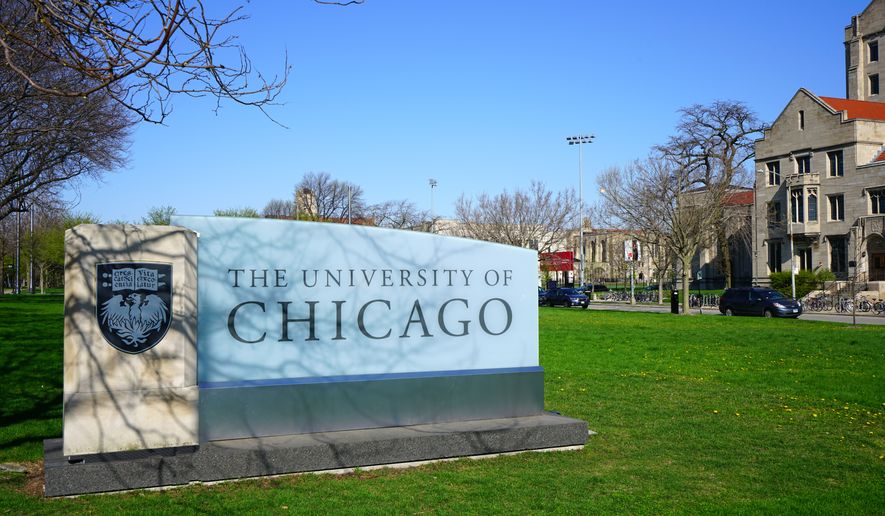A University of Chicago medievalist has formed a social media poetry group that trains writers to mock “woke politics,” including abortion supporters, as part of what she calls a bid to save Western civilization through preserving the English language.
Professor Rachel Fulton Brown, a medieval history professor at the Chicago school since 1994, said she set the group up on Telegram in summer 2020 with 10 people who soon set to work on lampooning abortion backers.
“The poets are ordinary people who come from all ages and levels of education looking to speak well and beautifully,” Ms. Fulton Brown told The Washington Times in an interview. “It’s about recovering our English literary tradition in the public sphere.”
Their first product, “Centrism Games: A Modern Dunciad,” is a satire of abortion supporters consisting of 210 stanzas, divided into seven chapters of 30 stanzas each. As part of the story, the Green Knight from the 14th century Arthurian chivalric romance “Sir Gawain and the Green Knight” follows different groups of real-life public figures and symbolic characters to illustrate modern-day political hypocrisy on the issue.
In a chapter titled “The Hollywoodlanders,” for example, a group of pro-abortion celebrities including Meryl Streep, Gwyneth Paltrow and J.J. Abrams encounter the knight everywhere on a tour of Los Angeles.
“The Green Knight is the voice of conscience harassing them for their hypocrisy,” Ms. Fulton Brown said.
At the end of the chapter, the knight mocks Michelle Williams, the actress who said in a January 2020 awards acceptance speech that she was so grateful that having an abortion gave her the chance for a career.
When New York’s Cuomo brothers — disgraced ex-Gov. Andrew and CNN host Chris — go on a pub crawl in New Orleans, the Green Knight confronts them in another chapter, calling them to task for being self-proclaimed Catholics who don’t follow Church teaching on abortion.
“He calls them fake Catholics and they get upset about that. They end up in jail and their lawyer won’t let them out,” Ms. Fulton Brown said.
The professor herself co-wrote a chapter in which a female priest, enticed by three witches, encounters a woman who had an abortion sitting in a bath of blood and asking her for a ritual to feel cleansed.
In Stanza 20, the three witches tell the girl: “Your womb is your own to use as you will; fill it with gemstones — or somebody’s swill.”
The priestess, drawn into the ritual, stands witness while the girl signs a Satanic contract: “The girl took the charter, wrote out her name./What was a soul worth when life offered fame?”
The priestess, thinking she’s gained knowledge and wisdom, goes blind.
The poem finally satirizes the Rainbow Boys, a gay couple who, wanting a child, offer money to a college student to be a surrogate mother.
After she’s inseminated, she realizes it’s her body, her choice, and she runs away.
Rhyming in heroic couplets, the poem takes its inspiration from Alexander Pope’s 18th-century mock-heroic work “The Dunciad,” which depicts journalists worshiping the goddess “Boredom.”
In “Centrism Games,” the poem’s characters worship the goddess “Fame.”
“Fame is wanting to have social approbation and we wanted to say that everything serves fame in the public sphere right now,” Ms. Fulton Brown said. “The target was people who surrender their principles in order to be part of the group.”
The professor said she chose Telegram, an alternative platform that can have chat groups attached to Instagram-style channels, because of its reputation for tolerating free thinking.
“It’s the platform where we can see the news of the world more clearly. It’s the stuff you don’t get to see in mainstream contexts,” Ms. Fulton Brown said. She added that group members enthusiastically embraced the challenge of writing the poem in a disciplined fashion based on traditional models.
“In our education, we’ve lost grammar, logic and rhetoric. It’s not critical race theory — it’s that we’ve lost the tools of thought to train our imagination and memory,” she said.
The professor said that the grammar, facts, dates and structures of classic English-language poetry have improved the group’s ability to argue critically with present popular culture.
“We don’t know how to make proper arguments anymore. Think about how much of our public speech, even in politics, is advertising,” she said.
Reflecting the poetry of the Middle Ages, all of the group’s work comes from an explicitly Christian worldview.
Ms. Fulton Brown, who received her Ph.D. from Columbia University in 1994 and was tenured at Chicago in 2002, said her efforts as a historian to understand religious belief from within have made it hard for her to get a full professorship.
“I’m not so much breaking the bounds of academic freedom, but of my discipline. My real struggle has not been so much what can I say in academia, but what I can say within my boundaries as a historian,” she said.
The Dragon Common Room poetry group is now working on a children’s poem, “Aurora Bearialis,” due to come out at Christmas from its self-published DCR imprint.
Ms. Fulton Brown describes it as a medieval grail quest for children with animal characters.
• Sean Salai can be reached at ssalai@washingtontimes.com.




Please read our comment policy before commenting.